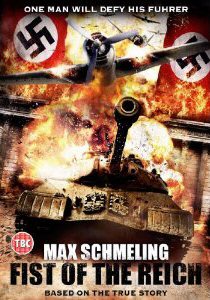
Uwe Boll does "serious cinema"? Surely not ...
During the Second World War, Max (Henry Maske) is a soldier fighting on behalf of his Germanic homeland: a member of the infamous Wermacht. He goes missing in combat and a superior officer sees fit to visit his family home and inform his wife of his death.
However, Max turns up injured and bewildered in Crete, where he’s nursed back to health in a makeshift medical camp. A telegram is sent to his superiors in Germany who remark among themselves, "My God, how many lives does this man have?". He is, after all, the only survivor of an entire battalion to have died at war.
Schmeling is not popular amongst his Nazi comrades; they would rather see him dead. But, as a successful and internationally renowned boxer, he is too high profile to wipe out. So instead, they set him missions that they assume he’ll fail.
Such a task is transporting a prisoner of war alone across a vast expanse of desert. But, despite being warned not to speak to one another, Max and his ward soon find a common ground in their love of pugilism. And so, Max begins to reminisce on his journey up the ladder of professional boxing.
The bulk of the film then flits between footage of various fights (admittedly very well shot and choreographed), and the behind-the-scenes aggro that frequently tainted his fledgling career. He was, after all, a victim of politics. Particularly ugly politics, at that.
One flashback shows how he was disqualified during one title match despite the crowd believing he had outfought the champion of the time. Max was subsequently berated by his coach and subjected to a life of superficiality as his manager paraded him in clubs as a celebrity of sorts. These scenes vaguely echo RAGING BULL.
Of course, all Max wanted to do was fight. And fight he did. At first in the ring, and then with his lover ... before finally being drafted into the war.
If you have to ask who Max Schmeling is, you don’t know your boxing. Heavyweight champion in the early 30s, he went on to fight Joe Louis twice in what are widely considered two of the greatest fights of all time. Full credit to Boll for even attempting to recreate them for the screen. In fairness, he doesn’t do a bad job – aided no doubt by the fact that Maske is a proficient boxer himself.
Clocking in at almost 2 hours in length, MAX SCHMELING is a weighty proposition. It certainly feels earnest – it’s based on a true story, and finds Boll back filming in his home country, in his native tongue, and about a subject he knows something about (he himself has boxed at semi-pro level). And there is no doubt, from the austere score and deliberated camerawork, to the sincere performances, that this is a film that he wants viewers to take seriously.
To his credit, Boll has made a fairly good film. It looks marvellous for the most part (the opening war scenes are perhaps the least convincing moments of the entire film) and the cast deliver the goods. Working from a suggested budget of £7 million, Boll seems to have used the money wisely: set design, costumes, make-up – it’s all extremely pleasing on the eye.
There is, as ever, something lacking though. It’s admittedly becoming increasingly difficult to pin-point what it is that Boll’s films miss. In this instance, everything looks great and sounds nice – there are some truly exhilarating fight scenes – but the domestic scenes are too soap opera-like to maintain any edge: the pace often falters.
The allusions to the politics that blighted Schmeling’s career are interesting (the false impression of his affiliation to the Nazi party; his reluctance to tow the line nationally), but are not satisfactorily explored. In fact, despite many enjoyable key scenes, the overall impression left from a sitting of MAX SCHMELING is one of being unfulfilled. It doesn’t impact in the manner that it should.
MAX SCHMELING is presented uncut in anamorphic widescreen (2.35:1) and looks frequently superlative. Colours are bold, blacks are steady, flesh-tones are accurate. There’s little to quibble about in this attractive, clean and sharp transfer.
Audio comes in the original spoken language of German. It’s offered in 2.0 and 5.1 mixes, both of which seemed dandy to these ears. English subtitles are provided, and appear to be problem-free.
The DVD opens with a vivid main menu page, animated with flames and pugilistic scenes from the film while stirring orchestral strains play on a loop. From there, a static scene-selection menu allows access to the film via 12 chapters.
The only extra on the disc is a Making Of featurette. Although very slickly put-together, this is disappointingly brief at only 10 minutes in length. But Boll is always worthy of a watch – arrogant, charming and sincere: there’s something extremely disarming about him. Even when he speaks in German, as he does in this subtitled offering.
Metrodome’s disc is defaulted to open with trailers for the critically acclaimed LEBANON, ATTACK ON LENINGRAD and CITY OF WAR.
MAX SCHMELING has an interesting figure at its core and is a good film in many respects. But it falls short of re-watchability, because of its uneven pace and reluctance to explore the machinations behind this enigmatic character’s career efficiently.
Review by Stuart Willis
| Released by Metrodome Distribution |
| Region 2 - PAL |
| Rated 18 |
| Extras : |
| see main review |